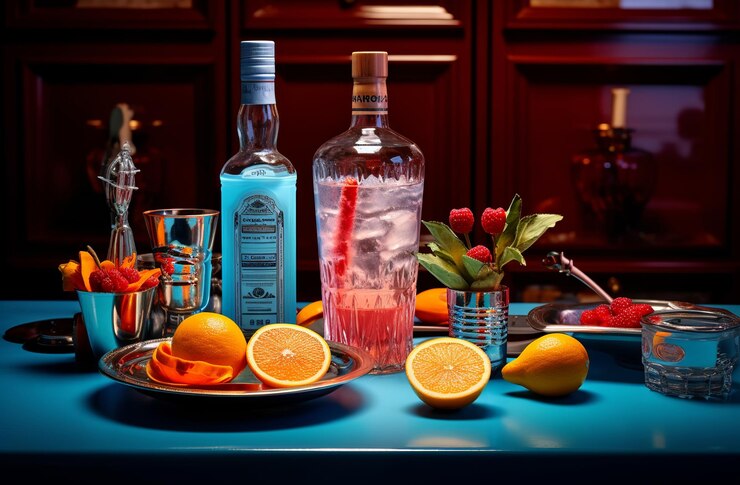Introduction
Liqueur, often referred to as cordial, is a sweet alcoholic beverage made from distilled spirits flavored with various fruits, herbs, spices, or other flavorings. These beverages typically have a lower alcohol content than spirits like vodka or whiskey but pack a punch of flavor. Liqueurs are widely enjoyed as a standalone drink, in cocktails, or as a flavorful addition to desserts.
History and Origins
Early Origins
The history of liqueurs dates back centuries, with early records tracing their origins to monasteries in Europe during the Middle Ages. Monks and alchemists experimented with distillation techniques, infusing spirits with herbs and botanicals for medicinal purposes.
Development over Time
As distillation methods advanced, so did the variety and complexity of liqueurs. From the ancient herbal concoctions to the sophisticated liqueurs of today, the evolution of these beverages reflects the ingenuity and creativity of generations past.
Types of Liqueurs
Liqueurs come in a diverse range of flavors and styles, catering to various tastes and preferences.
Fruit Liqueurs
Fruit liqueurs are crafted by infusing distilled spirits with the essence of fruits such as berries, citrus, or tropical fruits. These liqueurs boast vibrant flavors and are often enjoyed as aperitifs or mixed into fruity cocktails.
Herbal Liqueurs
Herbal liqueurs are infused with a blend of herbs, spices, and botanicals, resulting in complex and aromatic flavor profiles. Popular herbal liqueurs include absinthe, chartreuse, and Jägermeister, each with its unique blend of ingredients.
Cream Liqueurs
Cream liqueurs, such as Bailey’s Irish Cream, combine distilled spirits with cream or milk, resulting in rich and indulgent beverages. These liqueurs are often enjoyed on the rocks or used to add creaminess to coffee or dessert cocktails.
Nut Liqueurs
Nut liqueurs, like amaretto and Frangelico, feature the nutty flavors of almonds, hazelnuts, or pecans. These liqueurs add warmth and depth to cocktails and desserts, making them a popular choice for cozy evenings.
Popular Liqueur Brands
From iconic classics to artisanal craft creations, there is no shortage of liqueur brands to explore. Some of the most renowned names in the industry include Grand Marnier, Cointreau, and Campari, each offering a distinct range of flavors and styles.
How Liqueurs are Made
The production of liqueurs involves a meticulous process of blending and infusing ingredients to achieve the desired flavor profile.
Ingredients
Liqueurs are typically made from a base spirit, such as vodka or brandy, which serves as the foundation for flavor infusion. Additional ingredients may include fruits, herbs, spices, and sweeteners, chosen for their aromatic and flavorful qualities.
Production Process
The production process varies depending on the type of liqueur being made but generally involves maceration or distillation of ingredients to extract their essence. These infused spirits are then blended with sugar syrup or other sweeteners to achieve the desired level of sweetness.
Serving and Pairing Liqueurs
Cocktails
Liqueurs are a versatile ingredient in cocktail making, adding depth and complexity to a wide range of drinks. From classic cocktails like the Margarita and Martini to modern creations like the Espresso Martini and French 75, liqueurs play a vital role in mixology.
Dessert Pairings
The sweet and flavorful nature of liqueurs makes them an excellent companion to desserts. Whether drizzled over ice cream, mixed into cake batter, or served alongside chocolate truffles, liqueurs elevate the dining experience with their decadent flavors.
Health and Safety Considerations
While liqueurs can be enjoyed in moderation as part of a balanced lifestyle, it’s essential to be mindful of their alcohol content and potential health risks.
Alcohol Content
Liqueurs typically have lower alcohol content than straight spirits but can still contribute to intoxication if consumed in large quantities. It’s important to drink responsibly and be aware of one’s limits.
Moderation
Moderation is key when enjoying liqueurs, as excessive consumption can lead to adverse effects on health and well-being. It’s advisable to pace oneself and alternate alcoholic drinks with water to stay hydrated.
The Art of Liqueur Tasting
Tasting liqueurs is a sensory experience that engages the senses of sight, smell, and taste.
Aroma
The aroma of a liqueur can reveal a wealth of information about its flavor profile, from the fruity notes of citrus liqueurs to the herbal aromatics of botanical blends.
Flavor Profile
Upon tasting, pay attention to the balance of flavors, noting any sweetness, acidity, or bitterness present in the liqueur. Take note of the lingering aftertaste and how it evolves on the palate.
Texture
The texture of a liqueur can range from silky smooth to thick and syrupy, depending on its ingredients and production methods. Consider how the mouthfeel enhances the overall drinking experience.
Liqueurs Around the World
Liqueurs hold cultural significance in many countries around the world, each with its unique traditions and customs.
Cultural Significance
From the limoncello of Italy to the ouzo of Greece, liqueurs are deeply ingrained in the culinary and social fabric of their respective regions. These beverages often play a role in religious ceremonies, celebrations, and traditional rituals.
Regional Variations
Different regions have their interpretations of liqueurs, utilizing local ingredients and flavorings to create distinctive beverages. Exploring these regional variations offers insight into the diversity of liqueur culture worldwide.
Liqueurs in Modern Culture
In recent years, liqueurs have experienced a resurgence in popularity, thanks in part to the craft cocktail movement and the rise of mixology as a culinary art form.
Trends and Innovations
Bartenders and enthusiasts alike are constantly pushing the boundaries of creativity, experimenting with new flavors, techniques, and presentations. From barrel-aged liqueurs to molecular mixology, the world of liqueurs is ripe with innovation.
Popularity in Mixology
Liqueurs play a central role in the world of mixology, inspiring bartenders to create innovative and Instagram-worthy cocktails. Whether crafting classic concoctions or avant-garde creations, liqueurs offer endless possibilities for creative expression.
Sustainability in Liqueur Production
As consumer demand for ethically sourced and environmentally friendly products grows, the liqueur industry is increasingly focused on sustainability and responsible production practices.
DIY Liqueur Making
For adventurous home bartenders, making liqueurs from scratch can be a rewarding and satisfying endeavor. With a few simple ingredients and some patience, it’s possible to create custom liqueurs tailored to personal taste preferences.
Liqueurs as Gifts
Liqueurs make thoughtful and elegant gifts for any occasion, from birthdays and holidays to weddings and anniversaries. Consider presenting a bottle of artisanal liqueur alongside a handwritten note or gourmet chocolates for a personalized touch.
Conclusion
Liqueurs are more than just alcoholic beverages; they are a celebration of flavor, craftsmanship, and culture. Whether sipped neat, mixed into cocktails, or used in culinary creations, liqueurs add a touch of indulgence to life’s moments, making them truly special.
FAQs
Are liqueurs and spirits the same thing?
No, liqueurs are sweetened spirits infused with flavorings, while spirits are distilled alcoholic beverages with higher alcohol content and no added sweeteners.
Can I drink liqueurs straight or should I mix them?
Liqueurs can be enjoyed neat, on the rocks, or mixed into cocktails, depending on personal preference and the specific liqueur.
Are liqueurs gluten-free?
Most liqueurs are gluten-free, but it’s essential to check the ingredients and production methods, as some may contain gluten-containing grains or additives.
What is the shelf life of liqueurs?
Liqueurs generally have a long shelf life and can last for several years if stored properly in a cool, dark place away from direct sunlight and heat.
Can I make my own liqueurs at home?
Yes, homemade liqueurs are relatively easy to make and can be customized with a variety of fruits, herbs, and spices to suit individual tastes and preferences.







